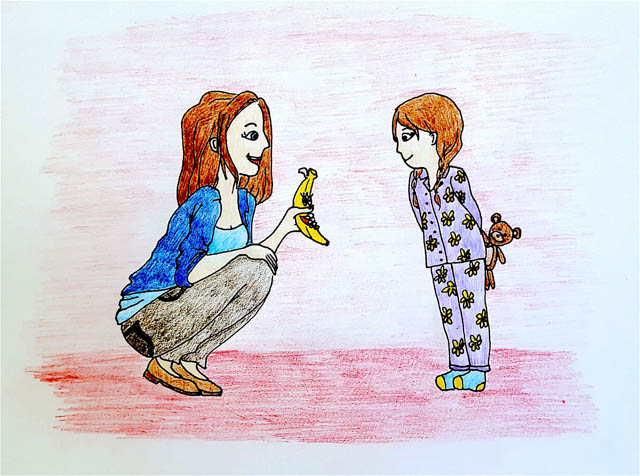Giggle Parenting for the Morning Rush
Using humour in parenting is the focus of this question and answer. It’s reprinted with permission from Kate Orson’s website. Kate is a Hand in Hand parenting instructor.
Hi Kate, I would love some advice on how to be more playful and laugh and relax with my kids. I am often way too serious and feel because of it my kids think I’m always mean and fussing at them. End result, I have two kids aged three and five who don’t listen well; they are actually very good kids but I feel so disconnected from them.
One of our biggest struggles is getting out the door in the morning. I don’t like rushing them and saying “hurry up” 100 times. Help!?
From “A”
Hi “A,”
Thanks for your message. It’s not easy getting two young children out of the door in the morning, and with all our responsibilities as parents it can be hard to figure out a way to bring connection into our daily routine.
I have a daughter who is not a morning person – at least that’s what I thought. Winter has been the worst, and my tactic to get her up for her one morning of playgroup a week was to wake her up at the last minute so she got enough sleep. Yet whatever I did she ended up grumpy.
Then one morning I suddenly had an idea. I decided to wake her up 15 minutes earlier than normal. Before waking her, I got every single soft toy she owned and put them around the edges of her bed. Then I found a balloon. The toys started “singing,” ‘’Welcome to the bed party, it’s a bed party,’’ and dancing as my daughter slowly woke up. Then they started bouncing the balloon round, and they bumped the balloon on my head, and I would start complaining, ‘’Hey toys! Why are you having a party? And stop bouncing that balloon on my head!’’ My daughter laughed at this, and that’s when I noticed her mood shifting from sleepy grumpiness into fun and joy.
Then the toys started bouncing the balloon too high and I would complain about that. My daughter laughed some more.
I then started introducing the idea of my daughter getting dressed, by her toy banana asking if she could get dressed now. There was still a bit of grumpy reluctance on her face so instead I lined up the toys, to get dressed by Banana, then Banana would throw them to the other end of the bed, saying, ‘’Hey, you’re not the one I need to get dressed for playgroup! Let me try again.’’
After we went through the whole line of toys my daughter happily let the banana get her dressed. We ended up with lots of extra time, and my daughter was co-operative through the rest of our routine.
I suddenly had the revelation that my daughter can be a morning person! She just wants a morning full of play and fun, not chores and drudgery. And we can get things done in playful way! I also realised that my daughter’s complaints about being “tired” were more about disconnection and her mood, than about lack of sleep. A few minutes less sleep meant a more connected child. Everyone was happier, and she could catch up on her sleep later.
You could try a “bed party” one morning with your children. It doesn’t mean you have to do so much fun and laughter every day, but it’s great to try if things have been getting serious. Then you could just add in a few giggles wherever and whenever you can. Perhaps have a soft toy get your child dressed, or a toothbrush that flies out of the bathroom instead of into your child’s mouth. Maybe when you serve breakfast the plates and cups start “jumping” off the table, saying that they don’t want to be eaten. You could set up some giggles before your children wake by having toys “wearing” your children’s clothes when they wake up. Then you can act all confused, because they aren’t the ones needing to go out.
You might want to set a timer for “playing-getting-ready-time,” so you can add lots of laughter without focusing on clock watching. Then after the timer goes off, you can switch into more productive mode.
These games can take a bit of extra time, but in the long run, they actually save time, because when children are more connected they are more co-operative.
Let me know how these work for you!
By Kate Orson
Kate is a Hand in Hand parenting instructor and author of Tears Heal: How To Listen To Children. Originally from the UK, she now lives in Basel, Switzerland, with her husband, author Toni Davidson, and their five-year-old daughter, Ruby.
Illustration by Lara Friedrich
Lara has been a freelance illustrator for Mothering Matters since early 2013. She is in her third year of University (majoring in Psychology) where she’s currently working as an assistant in a research project in pedagogy. Lara is also an assistant translator from German to English for various fiction books, and also works as a demo singer for the songwriter Kate Northrop.




